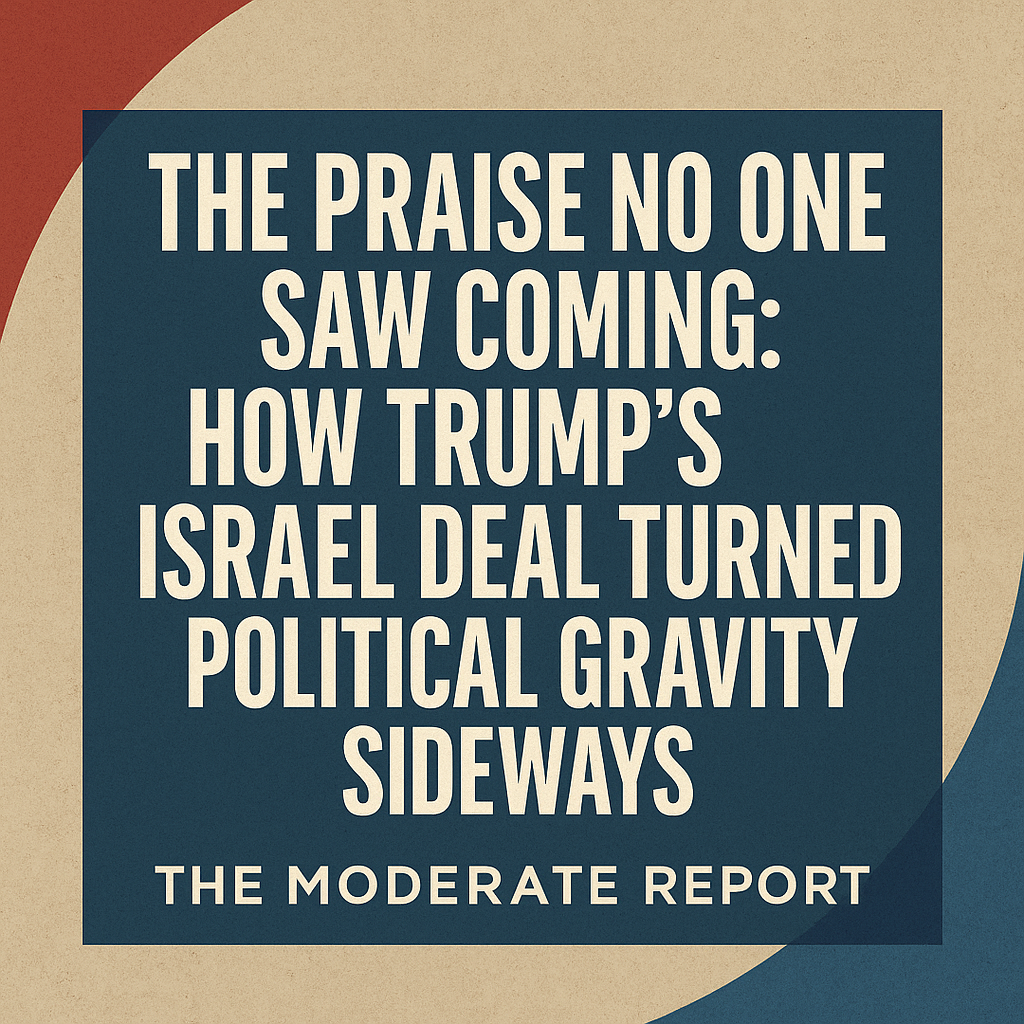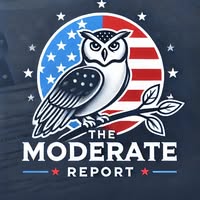 NEW BLOG:
NEW BLOG:
By Dr. Christopher Miller
Deported to Danger: Why Sending Migrants to South Sudan Is a Bipartisan Failure
By The Moderate Report
In a shocking and little-publicized move, the Trump-aligned wing of the U.S. government has begun deporting certain migrants to South Sudan, a country the State Department itself classifies as “Level 4: Do Not Travel.” Amid civil unrest, famine, and one of the most fragile states on Earth, it is incomprehensible that any American administration would choose this as a destination for migrants—many of whom may have committed no violent crimes, other than overstaying a visa or requesting asylum improperly.
This isn’t just a misstep in immigration policy; it blurs the lines of legality, morality, and basic human decency.
Noem’s Compassion Vacuum and the Collapse of Habeas Corpus
South Dakota Governor Kristi Noem has publicly defended this approach with a level of detachment that’s disturbing for a leader in a nation that once prided itself on being a beacon for the world’s tired and poor. In recent hearings, Noem dismissed concerns about the safety of deportees and failed to acknowledge the constitutional rights of individuals to due process, specifically the protections under habeas corpus—a foundational legal safeguard against unlawful detention.
Her testimony showed not just a lack of compassion but a fundamental misunderstanding—or willful dismissal—of what it means to follow rule of law in a democratic republic.
Democrats: Right Values, Wrong Voice
On the other side of the aisle, Democrats have once again squandered an opportunity to speak with moral clarity. In Tuesday’s hearing, Senator Richard Blumenthal referenced “due process” repeatedly, but lacked the urgency and emotional resonance needed to make this issue matter to the broader public. There was no fire, no unifying language, no call to arms. Just bureaucratic repetition.
Due process is critical—but it means little when it’s invoked in the cold language of legal briefs rather than communicated as a core American value under siege.
This is exactly why moderates are frustrated. We see injustice, we see dysfunction, and all we hear is either heartless legality from the right or uninspiring technicality from the left.
This Is Human Trafficking by Bureaucracy
Let’s call this what it is: state-enabled human trafficking. To forcibly relocate vulnerable individuals—some with legitimate asylum claims—to a country with active conflict and humanitarian collapse is not deportation. It’s abandonment into chaos.
According to the U.S. Department of State, South Sudan faces extreme risks, including murder, kidnapping, and armed conflict. There is no infrastructure to safely receive or process deported individuals. There are no support systems in place. This isn’t “removal”; this is a sentence to probable harm.
The Moderate Solution: Fast-Tracked Due Process and Smart Diplomacy
Enough is enough. The American people want solutions—not slogans.
It’s time moderates from both parties come together to introduce a congressional-backed immigration reform bill with three key elements:
1. Establish Federal Fast-Track Immigration Courts
Create a system of triaged, regional courts focused on due process within 10-14 days, allowing individuals to be screened and judged efficiently without indefinite detention or rushed deportations. These would be specially staffed and funded, with rotating magistrates and asylum specialists. Courts must operate under the transparency of public scrutiny and legal oversight.
2. Mandate State Department Accountability
Require the U.S. State Department to negotiate repatriation agreements with countries of origin, especially those refusing to take back their nationals. If a country is deemed too dangerous for return—like South Sudan—the U.S. must either partner with safe third countries or provide monitored detention with legal resources until a humanitarian or resettlement option is viable.
3. Enforce Oversight and Public Reporting
Implement monthly public reports on deportation destinations, individual outcomes, and partnerships with international organizations to ensure safety, compliance with international law, and transparency.
Conclusion: Immigration Should Not Be a Death Sentence
The American immigration system is broken. But its collapse doesn’t justify turning human lives into pawns in a game of partisan optics.
Sending people to war zones is not a solution—it’s a scandal. Democrats must learn to communicate with conviction. Republicans must remember the Constitution applies to everyone. And moderates must seize this moment to present a practical, principled plan that honors security, dignity, and justice.
We don’t need more chaos.
We need competence. Compassion. And courage.
Join the conversation at TheModerateReport.com
Let us know your thoughts on immigration reform, due process, and what real leadership should look like.
COMING SOON: our moderate discussion forum.
NEXT UP:
Centrism: The Sensible Middle Ground in American Politics
By Dr. Christopher Miller
Centrism often gets a bad rap in today’s polarized political climate. Centrists are frequently dismissed as fence sitters, undecided voters, or individuals who are uninformed or disinterested in the issues of the day. However, this perception is far from accurate. Centrists are not apathetic; they are pragmatic. They actively seek common ground, prioritize coalition-building, and work to fend off extreme views from either side of the political spectrum. In fact, centrists often provide the steady hand that guides societies through turbulent times by focusing on sensible and effective solutions to problems.
What It Means to Be a Centrist
Centrists are driven by the belief that compromise is not a weakness but a strength. They understand that progress often lies in the gray areas, where diverse perspectives meet and create actionable solutions. Unlike partisans who may prioritize ideological purity, centrists value practicality and inclusivity, striving to address the concerns of the broader population rather than catering to the extremes.
This approach requires an informed and deliberate mindset. Centrists are not undecided; they are deeply engaged. They analyze the merits of ideas from across the political spectrum and reject binary thinking. By focusing on evidence-based policies and fostering collaboration, centrists aim to create sustainable progress.
The Historical Roots of Moderation: The Whig Party
Centrism is not a new concept in American politics. Historically, the Whig Party represented a moderate and influential force during the mid-19th century. Formed in opposition to President Andrew Jackson’s Democratic Party, the Whigs championed a balanced approach to governance. They sought to promote economic development, strengthen infrastructure, and balance the interests of different regions of the country.
While the Whig Party eventually dissolved in the 1850s, its legacy serves as a reminder of the importance of moderate voices in shaping American politics. The party’s emphasis on compromise and coalition-building resonates with the principles of modern centrism. Whigs understood that governing a diverse nation required practical solutions rather than rigid ideologies.
The Role of Centrists in Today’s Politics
In today’s hyper-partisan environment, centrists play a critical role in bridging divides. They recognize that extremism—whether on the left or the right—often alienates the majority of citizens who seek reasonable solutions to pressing issues. By focusing on collaboration, centrists aim to:
Break Political Gridlock: Encourage bipartisan cooperation to pass meaningful legislation.
Appeal to a Broader Audience: Represent the interests of the politically homeless—those who feel disenfranchised by the two-party system.
Foster Unity: Promote dialogue and mutual understanding among diverse groups.
Dispelling the Myths About Centrism
It is crucial to challenge the misconceptions that centrists lack conviction or are unwilling to take a stand. On the contrary, centrists are often the most steadfast in their commitment to finding workable solutions. They reject the divisive rhetoric that dominates modern discourse and instead champion a pragmatic approach that prioritizes the common good.
Centrists are not afraid to take unpopular stances if they believe those positions are in the best interest of society. Their goal is not to appease everyone but to create policies that benefit the majority while respecting minority viewpoints.
Why Centrism Matters
As political polarization continues to erode trust in government institutions, the need for centrist voices has never been greater. Centrists offer a path forward by rejecting the false dichotomy of “left versus right” and focusing on what works. They remind us that progress is not achieved through ideological purity but through thoughtful compromise and collaboration.
By building coalitions, seeking common ground, and standing firm against extremism, centrists provide a vital counterbalance to the divisive forces shaping modern politics. In doing so, they carry forward the legacy of moderate leaders like those in the Whig Party, who understood that governance is most effective when it reflects the needs and aspirations of all citizens.
Centrism is not a middle ground of indecision; it is a deliberate and principled choice to pursue sensible solutions in a complex and diverse world. As the United States grapples with the challenges of the 21st century, the centrist perspective remains an essential force for unity, progress, and hope.



 NEW BLOG:
NEW BLOG:

